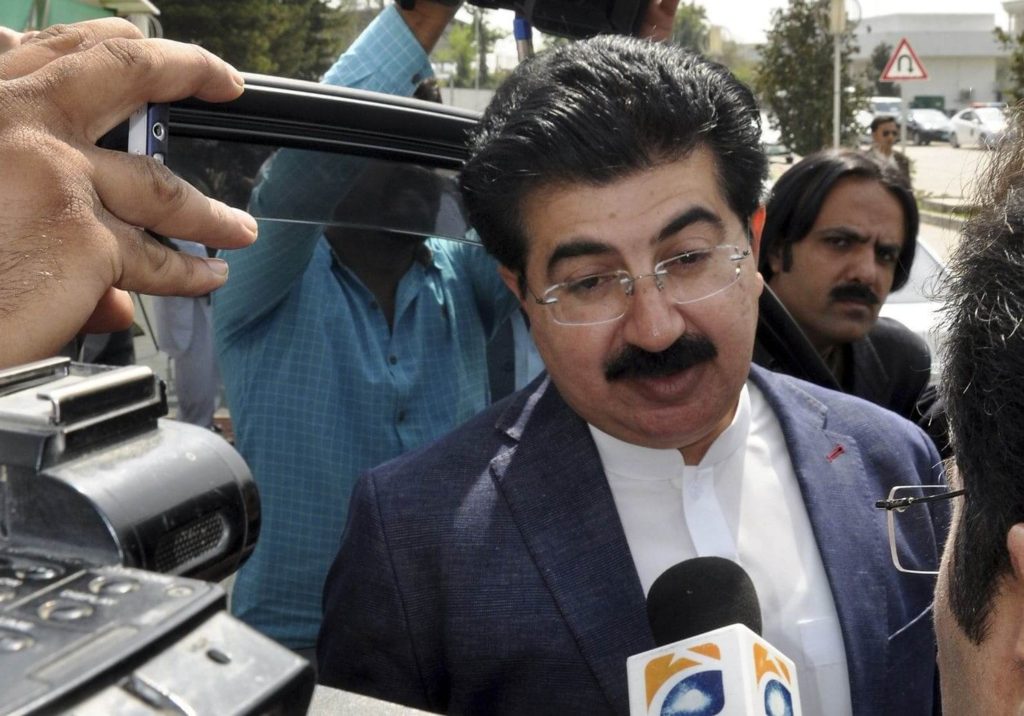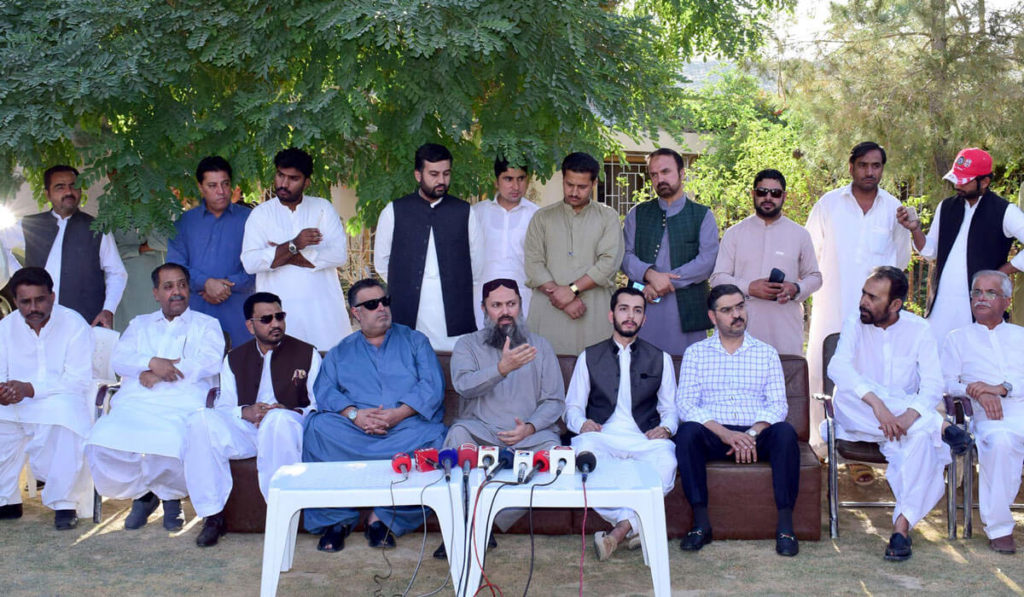Unfair Advantage
By Shah Miraan | Newsbeat National | Published 7 years ago

A political unknown: Senate Chairman Sadiq Sanjrani
As in other parts of the country, preparations for general elections are in full swing in Balochistan, with the political landscape changed by recent developments, including the formation of the Balochistan Awami Party (BAP), the collapse of the coalition government and wholesale defections from the PML-N. The BAP was formed a couple of months ago, allegedly with the help of the establishment, after 18 out of 21 MPAs and four of five MNAs ditched their party, the PML-N, to join it.
The legislators revolted against PML-N Chief Minister, Nawab Sanaullah Zehri, in January this year, forcing him to tender his resignation. They got six like-minded individuals elected to the Senate. Later one of the group, Sadiq Sanjrani, a front man for politicians and bureaucrats, was elected Chairman Senate, with the support of the establishment, backed by the PPP and PTI. The two lady members, Speaker Balochistan Assembly Raheela Durrani and Kishwar Jattak, were courageous enough to stand by their party, the PML-N, defying pressure.
All the turncoats with a history of supporting the king’s party are now in the BAP fold. Jam Kamal, who was a member of Shahid Khaqan Abbasi’s cabinet till April, was made president of the party, while an old guard of the establishment, Syed Saeed Hashmi, played the role of founder and chief whip, to herd the young parliamentarians in the direction of the establishment’s liking. His father and grandfather supported in turn, General Ayub, Z.A. Bhutto, Zia-ul-Haq, Nawaz Sharif and Musharraf. Qudoos Bizenjo was elected CM, and an unknown, Allauddin Marri, became the caretaker Chief Minister.
It has become obvious that Jam Kamal will head the ruling coalition to be formed after the general elections, as the establishment’s favourite. He is the son of the late Jam Yousaf and grandson of the late Jam Ghulam Qadir. Both remained chief ministers, the former in Musharraf’s regime, 2003-2008, the latter in Z.A. Bhutto’s government in 1974 and in the Zia era, 1985-1988.
Jan Jamali, who was also chief minister (1998-1999), and Saleh Bhootani, who served as caretaker chief minister prior to the 2008 elections, are expected to make another attempt to bag the CM’s slot, through lobbying for establishment support. Bhootani, who shares the National Assembly constituency NA 272 Lasbela-Gwadar with Jam Kamal, is pitting his younger brother, Aslam Bhootani, former Speaker Balochistan Assembly, against Jam on the NA seat. The Bhootani family is also extending clandestine support to PPP’s candidate, Muhammad Hassan, against Jam Kamal on Provincial Assembly seat PA 50, Lasbela-II.
Among the younger lot, Qudoos Bizenjo and Sarfaraz Bugti are also aspirants for the CM’s post. This time around, both face tough competition in the elections. Bizenjo’s constituency, which is in the control of Baloch militants, was extended to Panjgur district under fresh delimitation, while Bugti faces a number of establishment-supported candidates. They include his cousin Tariq Masoori, Bugti chieftain Nawab Aali (if the court grants him relief in the appeal against the rejection of his nomination) and Mir Gohram Bugti, grandson of Nawab Bugti.
There is a general perception in Balochistan that the BAP will emerge as the sole majority party in the ensuing general elections, with a parliamentary strength of 20 to 25 out of 65 MPAs, including reserved seats and four to six MNAs. “BAP will be unable to prove itself in the elections and it will be exposed on July 25. It is not a new phenomenon; such parties are formed with the usual faces for a particular purpose,” says former Chief Minister Nawab Aslam Raisani. “There are reservations about the holding of free and transparent elections. If the apprehensions are borne out, it will be catastrophic for the country,” said MMA candidate from NA 266 Quetta III, Hafiz Hussain Ahmed.
 The Jamiat-e-Ulema-e-Islam-Fazal (JUI-F), a pro-establishment party, contesting elections from the MMA platform, could be a coalition partner, with 12 to 15 PA and four to five NA seats in a BAP-led government. The JUI-F fully supported the move to dislodge Sanaullah Zehri and was rewarded with the lion’s share in development funds in the 2018-2019 budget. It won 17 PA seats in the 2003 elections, 10 in 2008 and eight in 2013. The JUI-F’s Maulana Ghafoor Haideri, former deputy Chairman Senate, is contesting on the provincial seat PA 32 Quetta-9.
The Jamiat-e-Ulema-e-Islam-Fazal (JUI-F), a pro-establishment party, contesting elections from the MMA platform, could be a coalition partner, with 12 to 15 PA and four to five NA seats in a BAP-led government. The JUI-F fully supported the move to dislodge Sanaullah Zehri and was rewarded with the lion’s share in development funds in the 2018-2019 budget. It won 17 PA seats in the 2003 elections, 10 in 2008 and eight in 2013. The JUI-F’s Maulana Ghafoor Haideri, former deputy Chairman Senate, is contesting on the provincial seat PA 32 Quetta-9.
Pakistan Tehreek-e-Insaf (PTI), which has never won a single seat in Balochistan, hopes to win a couple of seats in the provincial assembly and may join the BAP coalition. Sardar Yar Mohammad Rind, the PTI head, seems perturbed over the formation of the BAP. He joined the PTI some three years ago in the hope of a landslide victory in Balochistan, with establishment loyalists joining the party.
The Balochistan National Party-Mengal has remained out of power for the last 20 years and is also keen to join the future government. Party leader, Sardar Akhtar Mengal, faces pressure from members of his party’s central committee to show flexibility towards the establishment and avoid using harsh language against intelligence agencies. Mengal was Chief Minister in 1997, with the support of the PML, for a year. Nawaz Sharif later withdrew his support to form a government with Jan Jamali as Chief Minister.
Akhtar Mengal is not acceptable to the establishment due to his brother, Jawaid Mengal, who allegedly runs the militant organisation, Lashkar-e-Balochistan. The BNP, with its two MPAs, supported the move against Zehri and in return was accommodated in the PSDP for the 2018-19 budget. If the establishment allows the party to contest elections freely, it may bag eight to 10 PA and four to five NA seats, otherwise it is likely to retain its two PA seats and one NA seat.
“If we are not allowed to contest the 2018 elections freely, this will be my last election. I will retire from politics and if my party’s workers and activists get involved in militancy, criminal activities, arms-running, drug-trafficking or human-smuggling, the establishment will be responsible for the consequences,” Sardar Akhtar Mengal told Newsline.
Shafiq Mengal, the head of a private militia supporting security forces against Baloch militant organisations, surfaced on the eve of general elections against his foe, the BNP. He holed up for a couple of years, after the establishment withdrew its support due to Mengal’s harbouring of terrorists and suicide bombers of the LEJ and TTP. He is also said to be involved in murder and abduction for ransom, extortion and highway robbery.
The Pakhtunkhwa Milli Awami Party (PMAP) has bleak chances of retaining its 2013 position — 14 PA and four NA seats. It launched a protest campaign against the delimitation of constituencies, but had to divert its attention towards electioneering, due to muted public response. There was a general impression that the party’s resounding success in the 2013 elections was helped by the establishment, so much so that it even won a seat in the Baloch-dominated Sariab area of Quetta. In the coming elections, the party may face difficulties in the presence of arch rivals, JUI-F and ANP. The party has lately been critical of the establishment’s role in Balochistan politics and blames military officers for dislodging the PML-N-led government in the province.
“When elections are rigged to keep people’s true representatives away from the democratic process, it causes much harm to the country. Today the stage is set for the official party — BAP — to win elections. I will be happy to be defeated in fair and free elections, but rigging will yield catastrophic results,” said PMAP head, Mahmood Khan Achakzai.
After mass desertions from the party, the PML-N has very few members to put up for elections and may hardly bag a couple of PA and NA seats. In the 2008 elections, only one MPA, Captain Khaliq Achakzai returned to the assembly on a PML-N ticket from the border town of Chaman. In the 2013 elections, the number rose to 10 and later to 21, after independents joined in.
The National Party (NP) which led a ruling coalition in 2013, after PML-N extended its support, is also perturbed by the sudden rise of the BAP. The party is at loggerheads with both groups of the BNP — Mengal and Awami — and faces difficulty in electioneering due to security concerns in the Makran area, with Baloch militants opposing the election process. The NP’s central leader, Dr. Abdul Malik Baloch, the former Chief Minister, is not contesting elections. His political rivals think that he may be trying to avert severe damage to the party in the wake of a possible defeat. The party may win two to three PA seats and possibly none of the NA seats. Party head, Senator Mir Hasil Bizenjo, who is vocal against the involvement of intelligence agencies in political affairs, claims that PML-N’s allies, the NP and PMAP, are being intimidated, while the BAP has been formed to oppose nationalist and democratic forces.
The ANP remained in the PPP-led ruling coalition in 2008, with two seats and on opposition benches with a single seat after the 2013 elections. It supported the establishment’s move of overthrowing Sanaullah Zehri and may join the BAP-led coalition government, if it gains parliamentary strength in the upcoming elections. The BNP-Awami may retain its single seat position of the 2013 elections or may increase it to two in the coming elections.
Baloch militant organisations, particularly the Baloch Liberation Front (BLF), which cut down its operations after security forces accelerated their operation against militants, have become active against political parties taking part in the elections. They have urged the general public to boycott the elections and stay away from electioneering, to avoid damage in the wake of their attacks. The house of former minister, Mir Asghar Rind, a BNP-Awami nominee, was razed to the ground in the Gomazi area of Kechh district, while the caravan of another former minister, Mir Hamal Kamati, a nominee of BNP-Mengal, was attacked with rockets during his electioneering in Gwadar. Similar attacks were made on the house of NP leader Aslam Buledi in Buleda (Kechh district) and on the motorcade of another NP candidate, Khair Jan Baloch in the Jhao area of Awaran district. After these attacks, the nominees of different political parties were confined to city areas, particularly Turbat town, the headquarters of Kechh district and Panjgur city.
“These separatists have become active again, roaming on motorcycles, wielding Kalashnikovs to threaten contesting candidates and political workers. We are unable to canvas in outlying areas because of threats by the militants,” said an NP leader on the phone from Turbat.
Political analysts predict the BAP-led ruling coalition will emerge as the largest sole majority party. However, some observers are of the opinion that the electoral battle may not be an easy win for the establishment which has already backed some unpopular and highly controversial decisions like replacing PML-N Chief Minister Zehri with Qudoos Bizenjo, and the appointment of the politically insignificant Allauddin Marri as caretaker Chief Minister. They say that while there are electables in the BAP, if the party’s parliamentary strength is inflated out of proportion, election results would become controversial. In that case, they would not be acceptable either to the political parties or to national and international election observers. 


